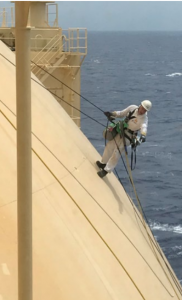The COVID-19 Pandemic: Responding to the Operational Challenge
The arrival of COVID-19 has presented truly enormous challenges for the entire maritime transport sector, an industry responsible for moving about 90% of global trade.

It is hard to exaggerate the impact of the pandemic on international ship operations. At this time of continuing crisis, working with governments to ensure the maintenance of safe and efficient supply chains remains the overriding priority for ICS and its member national shipowners’ associations.
As a result of the pandemic, the economic fortunes of large numbers of individual shipping companies have been greatly affected due to the severe contraction in demand for their services and dramatic levels of freight rate volatility. The cruise ship industry, in particular, has faced incredibly difficult challenges, with virtually all operations suspended during the initial stage of the crisis.
“To keep maritime trade moving, ICS has co-ordinated a unified industry response to COVID-19 to ensure rapid development of comprehensive guidance for ship operators and detailed recommendations for dissemination to governments”
Industry co-ordination
As soon as the global scale of the pandemic became clear, ICS took on a leadership role to provide a co-ordinated industry response, particularly with respect to addressing immediate operational challenges. This has involved close liaison with relevant global bodies including the industry’s global regulator, IMO, as well as with the International Labour Organization (ILO), the World Health Organization (WHO), the United Nations Conference on Trade and Development (UNCTAD) and the office of the United Nations Secretary General, utilising the strong relationships which ICS already enjoys with these intergovernmental agencies.
ICS has also worked closely with maritime industry organisations such as the International Association of Ports and Harbors (IAPH), the International Association of Classification Societies (IACS) and most importantly – as the global union representing the interests of some two million seafarers employed by the shipping industry – ICS’s social partner, the International Transport Workers’ Federation (ITF).
At the outbreak of the crisis, ICS sought to ensure that the need to identify seafarers as ‘key workers’ and the necessity that maritime trade should continue to flow, would be identified as critical priorities by governments around the globe. Supported by high level media communications, ICS lobbied for affirmation of these priorities at a series of emergency G20 Leader Summits on COVID-19 held in March/April 2020.
But words from governments still need to be followed by action, especially with respect to facilitating ships’ crew changes, an issue that is far from being resolved.
Developing recommendations
Because of the closure of the IMO headquarters in March 2020 and the suspension of scheduled meetings of IMO Member States, the development of more detailed guidance to governments on COVID-19 initially proved a major challenge. Working closely with the IMO Secretary-General, as well as with the leaders of international industry associations, ICS endeavoured to fill this temporary vacuum, co-ordinating the rapid development of recommendations that enjoy the full backing of the entire maritime sector, which the IMO Secretary General could bring to the attention of all IMO Member States as part of a series of special IMO circulars.
Industry co-ordination
Throughout the ongoing crisis, ICS has hosted regular online meetings with its global network of member national shipowners’ associations, in addition to frequent joint meetings with the leaders of more than 15 other international maritime industry organisations, to keep all informed of global developments and to formulate a common strategy for addressing immediate challenges. Communications experts in ICS national associations have also met regularly to ensure common presentation of
the industry’s priorities. The ICS Chairman and Secretary General have given frequent interviews to the mainstream global media on behalf of the shipping industry throughout the pandemic. In particular, widespread media coverage has been given to the crew change crisis, including an ICS co-ordinated global ‘shout out’ on 1 May 2020, when ships in ports around the world sounded their horns in unison.

But as the crisis continues, the fundamental difficulty remains that regardless of the obligations of governments under existing international maritime regulations adopted by IMO, ILO and WHO, instructions from national political leaders and local health authorities have often taken precedence over
the advice of maritime transport officials. This has served to highlight the vital role played by ICS’s member national shipowner’s associations which, in co-operation with national seafarers’ unions, have been liaising directly with the many different government agencies involved in applying special measures to shipping, to ensure that the impact on ship operations is minimised as far as possible.
Looking ahead
In September 2020, the shipping industry is still very much in the eye of the storm. As discussed below, hundreds of thousands of seafarers have had to extend their tours of duty at sea, and many shipping companies are still unable to conduct crew changes due to the health restrictions put in place by many local authorities. Helping to resolve the global crew change crisis remains a critical issue of the utmost importance. Unfortunately, despite an improving situation in some countries, COVID-19 infection rates appear to be increasing in many developing nations, and the risk of a ‘second wave’ of infections towards the end of 2020 means that the
current crisis is far from over. Nevertheless, throughout the pandemic, the vast majority of ports worldwide have remained open to visiting ships for the discharge and loading of cargo, including the energy, raw materials and food (as well as vital medical supplies) on which the global economy depends. There are still many operational challenges, not least the ongoing crew change crisis, that must be urgently resolved in co-operation with governments, not to mention some profound economic and structural issues that will need to be addressed when the industry eventually emerges into the post pandemic landscape.

Related content

Coronavirus (COVID-19): Guidance for Ship Operators for the Protection of the Health of Seafarers, Fifth Edition

Coronavirus (COVID-19): Guidance for Ship Operators for the Protection of the Health of Seafarers, Fourth Edition

ICS launches its 2020 Annual Review in Chinese
